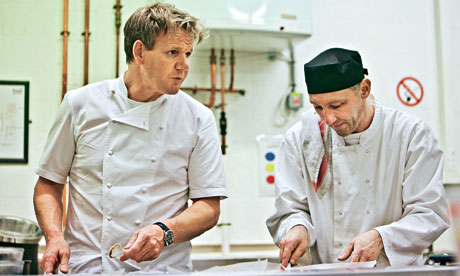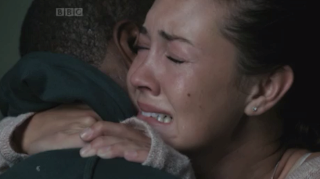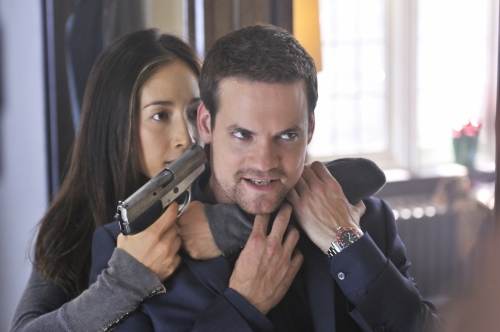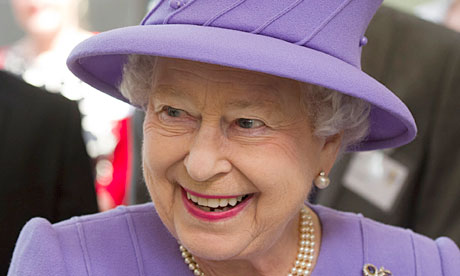Odd things, fads. A few months ago I became beset with a desire to master French. It was only after I’d frittered away £50 on audio CDs, manically scoured bookshop shelves for beginners guides and altered my laptop settings from English that I had my arriere-pensee. Me? French? I don’t even like cheese. Another time, I made eBay my monthly hang up. My wardrobe space surged as I mercilessly flogged anything greater than six months old, leaving me with precious little but a select array of summer clothes....at the close of August. And I can’t begin to list the passing fancies of my younger years. When I was 13 I came to the realization that I was depressingly middle class, and that to stand any chance of survival in school I had to rapidly reinvent myself. I started chewing gum theatrically, invested in R&B music that I neither understood nor much liked the sound of and, to crown my new mirage, tried to give myself those two little eyebrow tram lines that footballers of the time had made swish. But I don’t blame myself for this whim-tendency; we’re a nation that thrives on short-lived manias. Call to mind those few months a couple of years back that were engulfed by the bird-flu furore (about the same time, as it happens, that I was embroiled in my 1.5-eyebrow phase- try coming across effortlessly streetwise whilst you’re hysterically disturbed by the sight of a low-flying pigeon, let me tell you). One need only flick through today’s papers to be struck by the spout of intense royalism we’re in the thick of right now. And I trust I needn’t remind anyone about our insatiability for a good ol’ (whisper it) petrol strike.
Apparently, telly producers, and more specifically the folks over on Channel 4, are no different to the rest of us when it comes to being fad-fans. On Tuesday evening they were in the violent throes of a whim I’m hopefully unlikely to adopt as one of my own short-lived fancies anytime soon: incarceration. The second the watershed struck, C4 bigwigs wheeled out not one, but two hours of behind bars entertainment. The latter, “Lifers”, was a documentary rerun exploring the psyches of men serving lifetime imprisonment, but it was the former, “Gordon Behind Bars”, that I called to the dock; it’s had more advert-break coverage than Go Compare over recent days, so I anticipated a corker. The 4-episode series trails Gordon Ramsay as he attempts to establish a lucrative food-production business, manned by the inmates of HMP Brixton and flogging produce to the public. The show promised to brew up mounting exasperation at our judiciary system with the trusted “turnaround” signature of Ramsay’s “Kitchen Nightmares”, seasoned, naturally, with Gordon’s stinging openness.
 | |
|
After the break, this Ramsay-as-we’ve-never-wanted-to-see-him-before split his core of 12 inmates into bakers and salesman. With the first group, Gordon heaped shameless and depraved congratulations on the craftsman of a rather woeful fairy-cake; it could have been the pride of any artless and disinterested four year old, but perhaps its menacing convict creator curtailed Gordon’s famously cutting judgement. The second group was taxed with thinking up a punchy brand for the business and they settled eventually for this gem: “Convict Cupcakes: The Real Taste of Prison”. On any former Ramsay-fronted show such a harebrained proposal would have provoked priceless and side-splitting scorn. With 6 proud and brawny inmates, though, Ramsay kept tightlipped and I stifled a yawn. In part three, Ramsay roused the boys for an early-morning briefing in their prison yard, and I was buoyantly braced for a fully-fledged, foulmouthed return to Ramsay-best. Then, the guys ribbed Gordon for donning a jacket in the nippy morning air; he whipped it off, smiled fawningly at his taunters, and lobbed it in the corner with any lingering morsels of authority. With its star displaying all the command of a fatigued nursery nurse, the show’s producers obviously felt compelled to feature their crowd-pulling celeb chef using a different tack. To compensate for Ramsay’s lack of hallmark unsavoriness, audiences were deluged with reminisces from his younger years. “I come from a rough background, and I saw a lot of sh*t growing up,” espoused a hard-done-by Gordon as he attempted to blend in with his new inmate gang. “I know the cost of prison,” he then feebly protested before retreating to his plush manor-house kitchen to reflect on the project ahead of him. The producers’ barefaced resolve to get some winning telly-time from their big-budget headliner was forgivable in the wake of his depressing taming, but one couldn't help but think they would have been better cutting their losses.
The show’s jailed tutees, queerly, became its redeeming features, and invigorated the episode with that bit of reprehensible humor that Ramsay stringently withheld. Anthony Kelly (a self-proclaimed “ducker and diver” of prison life), Lawrence Gibbins (halfway through his 76th sentence, this time for assault) and Tespa Jones (who cited a cell as the predominant backdrop to his teenage years) hogged most of the camera’s gaze and, in so doing, made their checkered pasts seem totally irrelevant. When Kelly was confronted with the challenge of scrambling eggs, he made a spectacular botch up and addressed Ramsay as “Gord”, but his cheeky-chappy attitude and unfazed gobbiness came off as more winning that criminal. Jones joshed his appointment as head veg-prepaper when the inmates attempted to cater for 800 at the shows climax and readily ridiculed his easy life on the inside (“Everyone on the outside can see we’re not living the luxury,” he muttered sardonically as he held up shoddily peeled spuds). These guys, in spite of their misdeeds, gave the episode a glimmer of fun.
 |
| Who's the star here? Ramsay was in the shadow of the dramatic inmates |
Any half-decent Ramsay “turnaround” show includes a locking of horns; a touch of dramatic disaccord before the transformation is wound up. In the main, its that pig-headed chef with an unbending faith in his mother’s menu, or the hardheaded restauranteur turning a deaf ear to Ramsay’s condemnation of the decor. In “Gordon Behind Bars”, with Ramsay lamentably but unequivocally out of action as a potential horn-locker, the onus fell to the captives, and they rose to it with aplomb. When it was put to the prisoners to dine together and not in their respective cells, Gibbins stormed about it meddling with his condiment choices and ignited a raucous row amongst the group. When, having successfully catered for Brixton’s entire haul of inhabitants, the prisoners were told someone had cozened supplies, they once more started squabbling (Tespa was the culprit, but his perplexity at having caused such a flap by bagging a few shoots of broccoli means I’m overlooking the slight). Though they could be crudely convivial, then, the show’s convicts could also be startlingly over-emotional and breath-batingly volatile, and they gave the show its juiciest points.
Judging by my lauding of the jailbirds for the last two paragraphs, one would be forgiven for thinking that I’m content to condone our much-slated judicial system- either that or I’ve adopted anarchism as my next fleeting fetish. It’s worth ramming home the point that despite its Ramsay-shaped errors, this show didn’t pooh-pooh the concerns the bulk of its audience would have of the inmates; that they’re totally unperturbed by life inside and, set alongside overtaxed law-abiders, have a rather easy time of it. Instead, they tackled the potential sticking point head on; Jones admitted “It becomes a holiday camp,” a busybody prison cook referred to the inmates as “customers” he seemed fearful to provoke and, in his intro voiceover, Ramsay commented on the financial drain of keeping prisons at their capacities. It would have been useless to scoff cynically at the apparent comfort of the inmates and cite it as a reason to tune in elsewhere; the guys themselves acknowledged it, with their tongues firmly in their cheeks, and made it even harder not to be on their side. Coupled with their penchant for banter, their making cooking chili con carne a tumultuous event and their relentless lambasting by any prison guard the producers happened to bump into (“They will lie to him, they will try to manipulate him, ‘cos thats what they do”), the inmates’ straightforwardness outweighed any doubts about their moralities.
In all, and no thanks to Ramsay, the show turned out to be salvageable; if focus shifts away from its namesake and lingers more persistently on the inmates, it could quite feasibly become my new Monday night craze...for a few weeks.






















